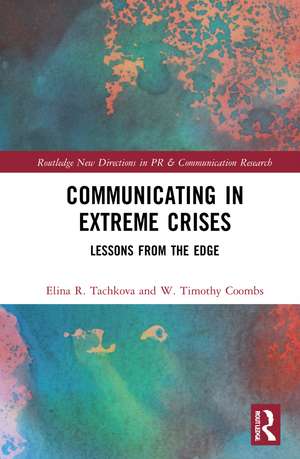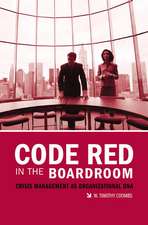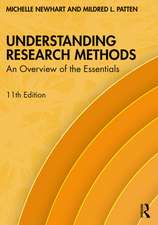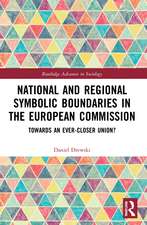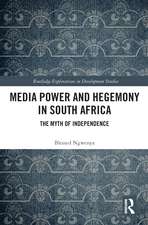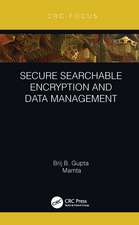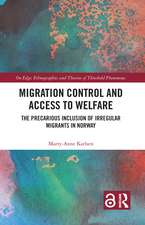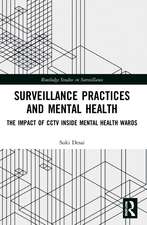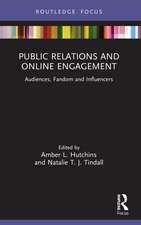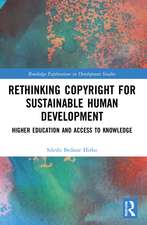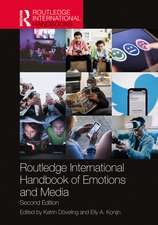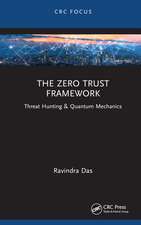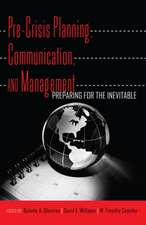Communicating in Extreme Crises: Lessons from the Edge: Routledge New Directions in PR & Communication Research
Autor Elisa R. Tachkova, W. Timothy Coombsen Limba Engleză Hardback – 17 mar 2022
Validated through research, the book establishes the nature of extreme crises, the optimal crisis response for such crises, and the KPIs (outcomes) crisis managers need to measure for extreme crises. It serves as a guide for how to communicate effectively during extreme crises and provides advice based upon experimental research that validates the effectiveness of the crisis communication interventions. The book does not require prior knowledge about crisis communication and crisis management; it contains summaries of crisis communication and management before exploring the more specialized topic of extreme crises. Chapters include extended case studies, examining communication within such events as the Westpac money laundering, VW emissions and COVID-19 crises.
Communications in Extreme Crises will be of direct interest to scholars of crisis communication in public relations, corporate communication, strategic communication, organizational communication programs and management.
Din seria Routledge New Directions in PR & Communication Research
-
 Preț: 324.43 lei
Preț: 324.43 lei -
 Preț: 384.14 lei
Preț: 384.14 lei - 26%
 Preț: 764.20 lei
Preț: 764.20 lei -
 Preț: 386.81 lei
Preț: 386.81 lei -
 Preț: 386.54 lei
Preț: 386.54 lei - 18%
 Preț: 1000.04 lei
Preț: 1000.04 lei - 18%
 Preț: 1049.30 lei
Preț: 1049.30 lei -
 Preț: 432.96 lei
Preț: 432.96 lei -
 Preț: 432.96 lei
Preț: 432.96 lei -
 Preț: 776.08 lei
Preț: 776.08 lei - 26%
 Preț: 763.62 lei
Preț: 763.62 lei - 26%
 Preț: 846.09 lei
Preț: 846.09 lei - 16%
 Preț: 276.70 lei
Preț: 276.70 lei -
 Preț: 325.30 lei
Preț: 325.30 lei -
 Preț: 386.54 lei
Preț: 386.54 lei -
 Preț: 381.45 lei
Preț: 381.45 lei -
 Preț: 386.81 lei
Preț: 386.81 lei -
 Preț: 386.81 lei
Preț: 386.81 lei - 18%
 Preț: 992.90 lei
Preț: 992.90 lei - 18%
 Preț: 992.90 lei
Preț: 992.90 lei - 26%
 Preț: 762.57 lei
Preț: 762.57 lei - 17%
 Preț: 255.66 lei
Preț: 255.66 lei - 18%
 Preț: 1048.50 lei
Preț: 1048.50 lei - 18%
 Preț: 992.90 lei
Preț: 992.90 lei -
 Preț: 477.20 lei
Preț: 477.20 lei - 25%
 Preț: 768.30 lei
Preț: 768.30 lei - 26%
 Preț: 847.31 lei
Preț: 847.31 lei -
 Preț: 465.91 lei
Preț: 465.91 lei - 26%
 Preț: 763.47 lei
Preț: 763.47 lei - 18%
 Preț: 997.97 lei
Preț: 997.97 lei -
 Preț: 386.54 lei
Preț: 386.54 lei -
 Preț: 386.81 lei
Preț: 386.81 lei - 18%
 Preț: 993.99 lei
Preț: 993.99 lei
Preț: 991.06 lei
Preț vechi: 1208.61 lei
-18% Nou
189.75€ • 194.65$ • 159.76£
Carte tipărită la comandă
Livrare economică 26 februarie-12 martie
Specificații
ISBN-10: 0367556790
Pagini: 170
Ilustrații: 2 Tables, black and white; 2 Line drawings, black and white; 2 Illustrations, black and white
Dimensiuni: 156 x 234 x 18 mm
Greutate: 0.4 kg
Ediția:1
Editura: Taylor & Francis
Colecția Routledge
Seria Routledge New Directions in PR & Communication Research
Locul publicării:Oxford, United Kingdom
Public țintă
Postgraduate and ProfessionalNotă biografică
W. Timothy Coombs is the George T. and Gladys H. Abell Professor in Liberal Arts at the Department of Communication at Texas A&M University, USA. His primary research area is in crisis communication, where he has been developing and testing the Situational Crisis Communication Theory (SCCT) which provides theory ground and empirically tested strategic advice for the selection of crisis response strategies.
Cuprins
Research methods: creating evidence
Evidence-based approach to crisis communication
Summary
References
2 The basics of crisis management
Risk management
Crisis management
The regenerative model
Summary
References
3 Understanding the value of and limitations to crisis communication
Crisis communication
Crisis interventions
Summary
References
4 Mapping extreme crises as part of crisis preparation
Crisis types: the starting point for preparation
Crisis preparation: basics and consideration of extreme crises
Summary
References
5 Understanding extreme crises: management misconduct and scansis
Moral outrage: basics and connection to crises
Management misconduct
Scansis
Race and crisis
Why worry about extreme crises
Summary
References
6 Considering boundary conditions and rethinking crisis communication outcomes
Boundary conditions
Danger: flawed conclusions about crisis interventions in extreme crises
Rethinking crisis outcomes
Summary
References
7 Articulating guidance for extreme crises
Extreme crises: the role of moral outrage
Optimal crisis interventions following extreme crises
Guidance for crisis practitioners
Future direction for crisis communication research
Summary
References
8 VW emissions scandal
Background on Volkswagen (VW)
Description of the emissions scandal
Overview of the crisis intervention
Summary of stakeholder reactions
Discussion questions
References
9 Purdue Pharma and OxyContin crisis
Background on Purdue Pharma
Description of the OxyContin crisis
Overview of crisis intervention
Summary of stakeholder reactions
Discussion questions
References
10 BP and the Texas City explosion, 2005
Background on BP
Description of the Texas City explosion
Overview of the crisis intervention
Summary of stakeholder reactions
Discussion questions
References
11 Westpac money laundering
Background on Westpac
Description of the Westpac money laundering case
Overview of the crisis intervention
Reactions to the crisis and crisis interventions
Discussion questions
References
12 Wells Fargo and secret accounts
Background on Wells Fargo
Description of secret accounts case
Overview of crisis intervention
Summary of stakeholder reactions
Discussion questions
References
13 EF Hutton and check-kiting
Background on EF Hutton
Description of EF Hutton check-kiting case
Overview of crisis interventions
Summary of stakeholder reactions
Discussion questions
References
14 The Mylan Pharmaceuticals price hike
Background on Mylan Pharmaceuticals
Description of the Mylan price hike case
Overview of crisis intervention
Summary of stakeholder reactions
Discussion questions
References
15 Rio Tinto destroys cultural site
Background on Rio Tinto
Description of the Juukan Gorge case
Overview of crisis interventions
Summary of stakeholder reactions
Discussion questions
References
16 COVID-19 and pandemic communication
What is a pandemic, and how does it affect organizations?
Anxiety as a driver for pandemic communication
Sample COVID-19 messages
Discussion questions
References
17 What we have learned
Models of crisis management
Reflecting on the importance of the crisis intervention
Guidance for extremophile crisis managers
Conclusion
References
Index
Descriere
This book is an evidence-based approach to handling common, extreme crises. Extreme crises involve strong moral outrage; moral outrage creates situations where traditional crisis communication advice no longer is effective. These extreme crises create unique demands for crisis managers. Moreover, much of the traditional advice and crisis key performance indicators (KPIs) no longer apply.
Validated through research, the book establishes the nature of extreme crises, the optimal crisis response for such crises, and the KPIs (outcomes) crisis managers need to measure for extreme crises. It serves as a guide for how to communicate effectively during extreme crises and provides advice based upon experimental research that validates the effectiveness of the crisis communication interventions. The book does not require prior knowledge about crisis communication and crisis management; it contains summaries of crisis communication and management before exploring the more specialized topic of extreme crises. Chapters include extended case studies, examining communication within such events as the Westpac money laundering, VW emissions and COVID-19 crises.
Communications in Extreme Crises will be of direct interest to scholars of crisis communication in public relations, corporate communication, strategic communication, organizational communication programs and management.
